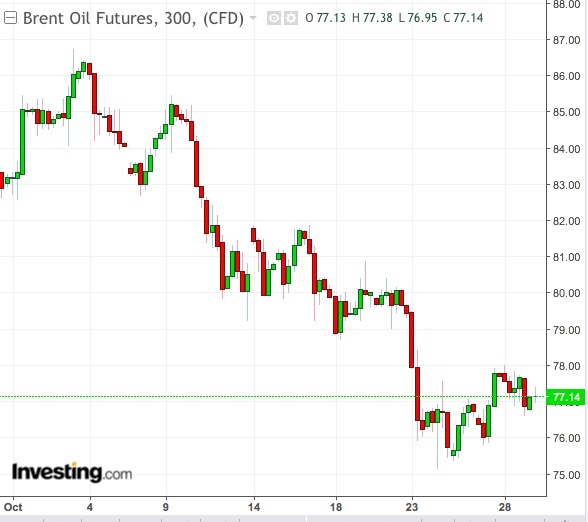Oil traders couldn’t be more confused. Two apparently conflicting stances by Saudi Arabia—that it will maximize crude pumping but could also cut production later this quarter—has left the market directionless.
More importantly, it has extinguished any immediate fear traders had about upcoming US sanctions on Iran and the supply squeeze expected from that. From worries that global oil output will lose 1.5-2.0 million barrels per day (bpd) when the sanctions come into force this Sunday, market participants now think the Saudis will be able to make up for any Iranian export glitches.
This narrative is being attributed to Saudi Energy Minister Khalid al-Falih. He was reported to have said last week that meeting customer demand in the vacuum of Iranian supplies was top priority for the Kingdom.
Murder Makes It Murkier
While there was some skepticism that Riyadh could go beyond its current production of 10.5 million bpd, Falih was taken at his word because he spoke at the height of the turmoil surrounding Saudi Arabia’s murder of journalist Jamal Khashoggi.
Many think the Khashoggi affair has put Saudi Arabia at the mercy of US President Donald Trump, who wants the Kingdom to raise output as much as possible so that oil prices won’t spike further from the sanctions on Iran and ahead of the all-important November 6 US mid-term elections. Heeding Trump’s calls is seen as a way for Riyadh itself to escape US sanctions over the journalist’s slaying.
Since Falih spoke, oil markets have indeed made a complete U-turn from their turbocharged rally of September, losing 3 percent last week alone as the rout in global equities added to ongoing headwinds.

With only a couple more days to the end of October, Brent, the global crude benchmark, is on track to a near 7 percent drop this month, its worst loss since July 2016. Brent hovers at $77 a barrel, and while there were bets in September that it could soon reach $100, at present it would be lucky to return to the 2014 highs of above $86 it hit just four weeks ago, some traders think.
Saudis Change Narrative, Iran Adds Own Spin
Days after Falih’s remarks, Saudi OPEC governor Adeeb Al-Aama—the country’s No.2 official for oil—sought to change market perception that Riyadh was maxing out on output by saying the oil market could be in oversupply later this quarter and suggested that production cuts may be necessary instead. But this only served to confuse traders, with many deciding to either hold their positions or continue selling, since the path of least resistance seemed to be lower. Last week’s rout itself left hedge funds’ bullish wagers on US crude at their lowest in more than a year.
Adding to the enigma over the impact of Iran sanctions was Tehran itself, which said on Sunday that it has started selling crude oil to private oil refining companies in the country for export, as part of a strategy to counter the sanctions. Reuters reported on Monday that tankers loading Iranian crude sometimes switch off their Automatic Identification Signal (AIS) and turn it back on later in their journey. Adjustments to tanker schedules and week-by-week variations of loadings further complicate the task of tracking, it said.
Global Reactions Make It A Bigger Puzzle
On the global front, while China has told its state-owned firms to stop buying crude from Iran, other major importers such as the EU and India are looking for ways around the US sanctions. The Trump Administration, meanwhile, fears Russia will buy Iranian oil and resell it as its own.
All these bring forth the question: Who holds the trump card on the Iran sanctions? The answer, it appears from all of the above, is that it’s not the US president.
Do The Saudis Hold The Trump Card?
London-based Energy Aspects thinks the Saudis, often described as the only oil producers to have “real” spare capacity, will eventually unravel the poker play by revealing their hand—that they cannot make up all the lost Iranian barrels.
The consultancy said in a note on Monday:
“Al-Falih did make the mistake of talking about both short- and long-term prospects of the oil market when attention spans have shrunk so much that separating the two has become too much to ask. Confusion reigns. Saudi Arabia is not going to push huge amounts of extra oil to the market.”
It added that the so-called political link between the Khashoggi affair and the Kingdom’s oil exports was a complete misread by the market, and that “Saudi Arabia does not have the capacity to produce more than 10.9 million barrels per day in the short run.”
Yet some, like Dominick Chirichella, director of risk and trading at the Energy Management Institute in New York, thinks that rather than a one-country response, a host of global supply-demand factors are what will decide the market’s ultimate reaction to the conundrum. Said Chirichella:
“I expect volatility to continue, for at least in the short term, as the market looks at every comment and data point regarding the potential impact from the Iranian sanctions.”
